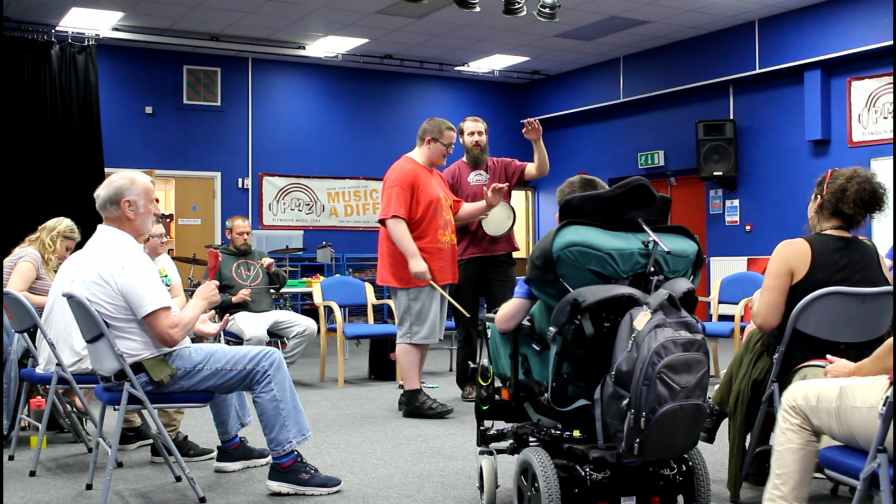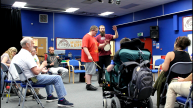Transferrable skills and music leading – Rob Tilsley on aligning and acknowledging skills

This post builds on my previous pieces about how music leaders and our workforce at Plymouth Music Zone have journeyed with us. What kind of skills sit within a person to make a really good music leader?
We developed a capabilities / skills matrix (see other post!) to help us define the skills of our music leaders specifically at Plymouth Music Zone. This is used within a supervision process regularly as a supportive and developmental tool. We also support the team through a raft of training.
I thought it might be interesting to have some conversations with individuals working for PMZ about their journeys as we celebrate our 20th Anniversary. I realise the roads travelled are all very different and we have some very interesting, creative people within our team. The team currently consists of a core of 11 contracted employees and up to 12 sessional music leaders. Here is a career journey shared by one of our core team, Rob, who was interested to talk more about the transferrable skills needed in the work.
Rob Tilsley is PMZ’s ‘Intergenerational Coordinator’ whose current post is funded by the National Lottery Community Fund. Rob’s work naturally crosses over into our work with children and young people. He often works with young people who transition over from Youth Music funded work after a particular age and begin to engage with our programme for adults. Rob is a music leader as well as core team member. He teaches privately as well as running an Astronomy charity (www.dartmoorskies.org). As with many music leaders and those working in community arts and charity / voluntary sector, sessionals and employees have a hugely varied skill set. Rob is certainly one of these people!
A quick zip through Rob’s employment history (which, incidentally, he doesn’t mind sharing!)…
- 2006 - 7 Marquee Erector (yes, there is such a job title!)
- 2009 – 2011 Driving Instructor
- 2011 – 12 “Soundskills” – music leader training course at Plymouth Music Zone
- 2011 – 2015 Driving Examiner
- 2015 – 16 Petrol Station sales assistant
- 2015 – current Private instrumental tutor
- 2016 – current Intergenerational Coordinator
- 2015 – current Director, Dartmoor Skies – Astronomy outreach charity
The journey...
Here are Rob's reflections about his journey, from setting up giant marquees, to training with, then working for Plymouth Music Zone, and, of course, the casual pursuit of exploring the universe (!) …
For me – getting on with people has been a survival mechanism. It’s been an adaptation - I had to have it. I don’t believe I’ve always actually had people skills. Speaking fully truthfully, I used to find it really hard to put myself into other people’s shoes and empathise with them. I didn’t have a very diverse experience in my early life, living in a primarily white, middle-class suburban area growing up. I’d never had contact with disabled people or people living with mental health challenges. I hadn’t worked with children or young people and had very little to do with older people either. This couldn’t be more different than my current work life at Plymouth Music Zone as ‘Intergenerational Coordinator’ and it has really helped me understand those who don’t have these connections either.
…so how did I get here if all of the above was the backdrop to my life?
When I finished my studies at Dartington College of Arts, despite all my new skills and learning, I did not have the confidence to go straight into music work. I had a complete lack of perspective looking back. I thought I would be a driving instructor (and later, driving examiner) for my reliable source of income and then do music ‘on the side’. This wasn’t actually the case in practical terms. However, this was the beginning of my journey to understanding people better. I began to be aware of meeting peoples' needs regardless of dispositions, ages, behaviours etc. with empathy. I don’t know if I consciously thought I had to ‘learn’ this. It was more like it came about through necessity. An example was when I was when I realised how many people have unseen disabilities were disclosing this to me prior to driving. They were sharing medical conditions and things they thought I needed to know because they were worried it would impact on their driving. I started having lessons where I was teaching older people who had maybe lost a partner and hadn’t driven for 20 years and needed their independence. I guess it didn’t matter who they were, I was learning about their lives and accumulating a kind of catalogue of understanding.
Other transferrable skills…
When I became a driving test examiner, the stakes were raised. It wasn’t just having to get on with somebody, you also might have to give them bad news and you have to be really adaptable to how the situation can change in a split second. There was a lot of anxiety I had when I had to put people on test who presented as quite imposing / aggressive-looking and I often worried about how they were going to react. I think that going through that experience was what led me to realise that there’s nothing to fear from anybody. They are all on their own journeys and their greatest opponent is themselves. Most likely they’d get angry at themselves and not you when they failed. Sometimes they expressed they thought decisions were unfair. If I was comparing this to people trying to learn drumming e.g. a young pupil I teach privately to play drum kit – he thinks he’s learning slowly or that things are too hard and he tends to ‘give up’, but he is in fact learning really quickly and has made huge progress in the years I’ve worked with him. It’s about his perspective where he can’t really see this. It’s my job to be there on a human level for him. It’s a lesson he has to learn on his own, but I can just try and be that sort of safe presence who stops him from self-sabotaging. In my drumming groups, I try and ask the right questions and help people to understand where they’ve made the jump and understand their progress. I think I’ve always appreciated the development of the people as much as their musical abilities. So, it’s like seeing a really anxious person perform really well on a driving test and this compares directly to a participant flourishing socially in a group where they used to shy away completely and withdraw from others. They are DOING IT. I’m just a facilitator. I don’t know if music ‘leading’ is the most helpful term, because for me, it’s been much more interesting to follow them and find out where they’ve taken themselves to and I’ve been lucky enough to sit alongside them and play a small part in that journey.
Connecting different life experiences within the work...
The young people I see in our Rhythm and Respect project (Big Lottery Funded – bringing together young people with those who they might not otherwise meet through music) I can see development gaps in some of the young people I work with. I kind of know things that they don’t know they don’t know if that makes sense? I can see where a little bit of awareness could go a long way towards helping them understand themselves and others better. A bit like my own experience?
There’s something about having my work with Dartmoor Skies alongside my work at Plymouth Music Zone that sets apart some magic and wonder from the everyday stuff. They are kind of exceptions to the everyday. They couldn’t be more different workplaces to where I worked before. Although it couldn’t be more different, you’re never going to get away from the universality of human experience. I take huge learning and value from sharing what I witness and what this means between people. It has enriched my own life experience and has very much shaped how I work as a music leader, among other things. All this has allowed me to recognise the value of connection myself and connections which happen between others. I am much more interested in evaluation work and trying to evidence those things in practice in much more meaningful ways.
I now also help support the supervision and ‘snapshot’ observation process of other music leaders to help ensure quality delivery across our varied programme. This peer critique is another kind of connection that is very important to our team.
Experiencing polyrhythms from North East Brazil (e.g. Candomble and Maracatu) or Ghana (Ewe and Ga) or gazing at galaxies 50million light years away allows you to forget you’re in Devonport in Plymouth sometimes!
So what has this got to do with a Youth Music Network post? Well a lot, because we are exploring what it takes to be a music leader. What are those special ingredients that we need within us to connect with, support learning and personal development of both children and young people (and in the case at PMZ, those of all ages)? It's a very complex picture and fascinating to unpick. We have music leaders who have formal music training, previous participants, apprentices, trained primary and secondary teachers, gigging musicians etc. and one of the key forces behind their passion for the work is striving to experience powerful human connections through music.


